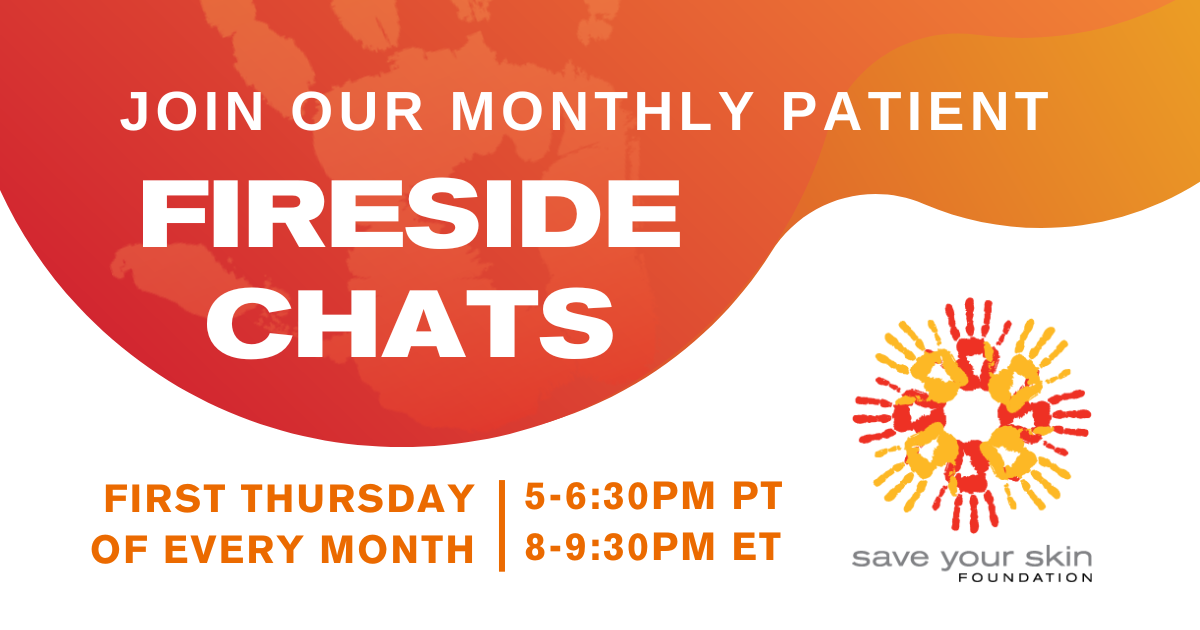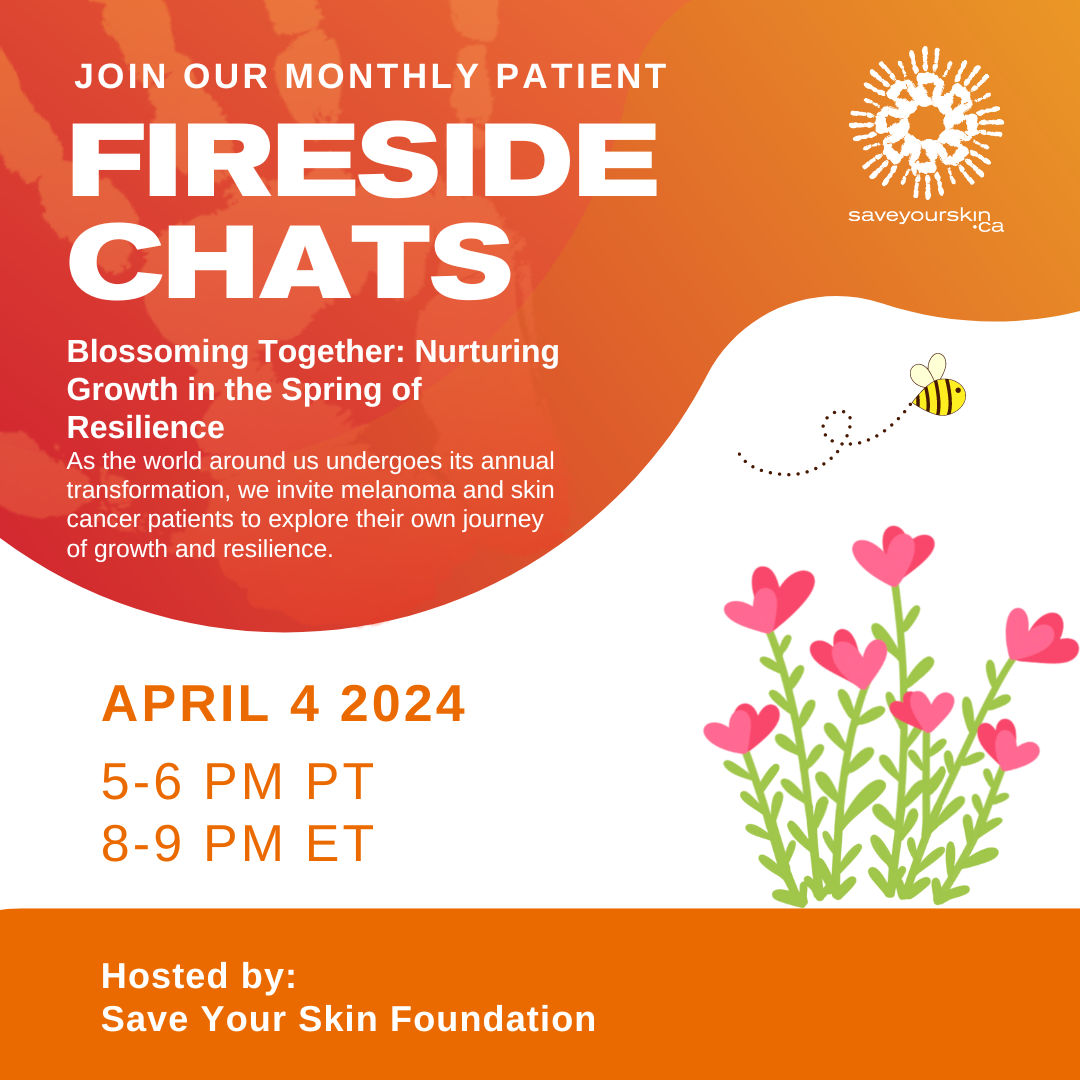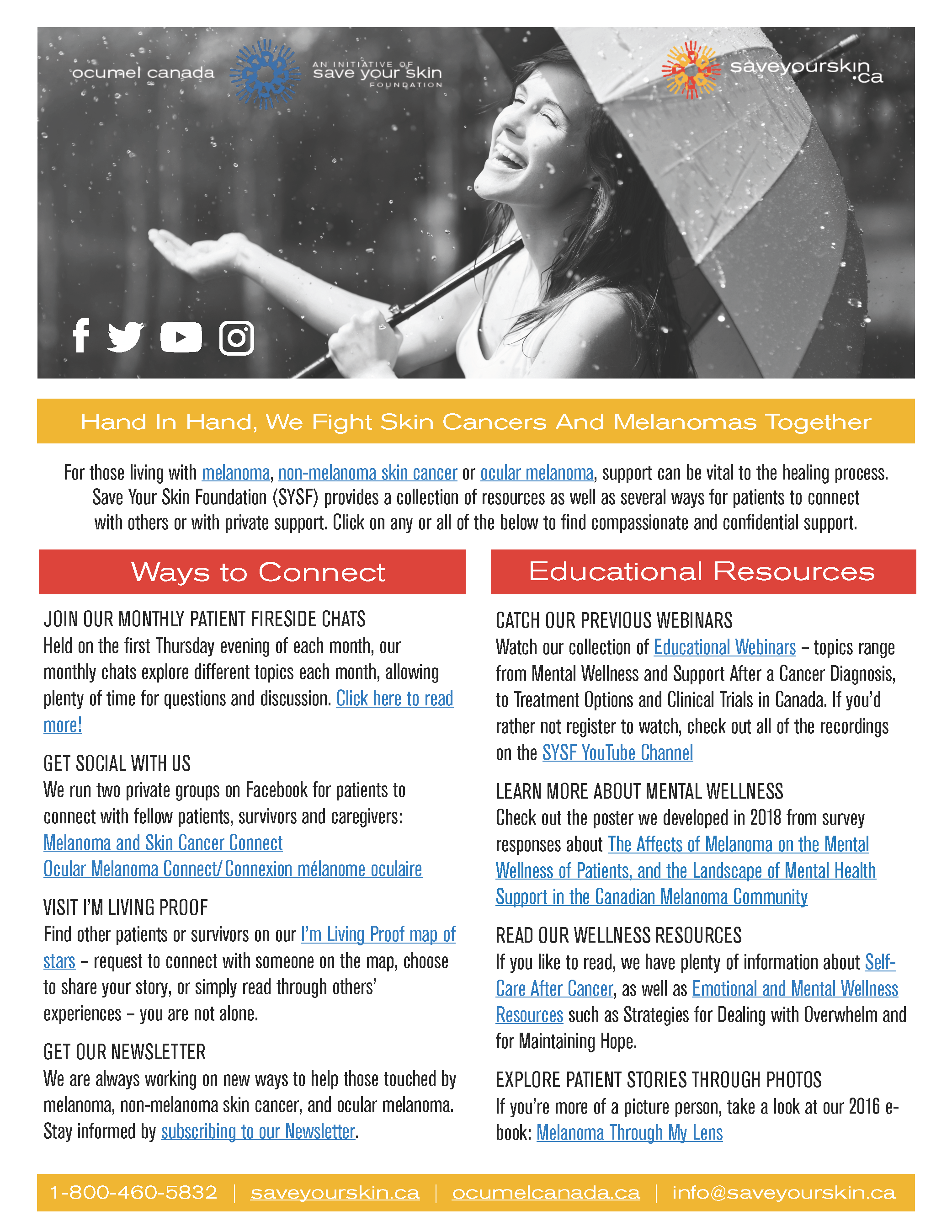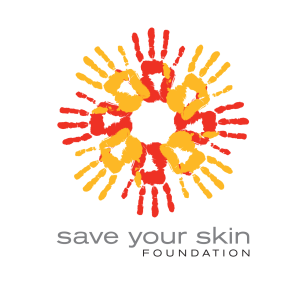HAND IN HAND, WE FIGHT SKIN CANCER TOGETHER.
Join our Monthly Patient Fireside Chats which have a small standing group of core hosts & new topics every first Thursday of the month. These fireside chats are for those looking for support that can be vital to the healing process.
Save Your Skin Foundation wishes to bring hope and support to all those touched by melanoma, non-melanoma skin cancers, or ocular melanoma – whether they are newly diagnosed, currently undergoing treatment, or “in remission” or referred to as “NED” – with no evidence of disease.
We invite all skin cancer patients, at any stage, to get in touch.
We are here to help. Call us at 1-800-460-5832 or email kathy@saveyourskin.ca
This year, we’re taking our Monthly Patient Support Chats in a new direction!
Meet our hosts!
Our monthly chats are attended by a small standing group of core hosts, including SYSF Founder Kathy Barnard and fellow survivors, who take turns leading the group in a themed topic each month, allowing plenty of time for questions and discussion.
Kathy Barnard, President, SYSF, melanoma stage 4 survivor
Kathy prioritizes patient care and support. She was a key player in federal tanning bed legislation for Canada’s Youth and she continues this area of focus on education and awareness, providing emotional and financial support to those dealing with melanoma and carcinoma skin cancers, prevention, access, and support of the ongoing research and treatment of skin cancer – from melanoma to actinic keratosis. As both a melanoma and immunotherapy survivor, Kathleen and her Foundation hope to share the experience and knowledge gained, by leading other patient groups in knowledge and advocacy training to ensure equal timely access to new treatments for all cancer patients.
In 2003, Kathleen was diagnosed with malignant melanoma, and by 2005 she was informed that her cancer prognosis was terminal. With limited help but unrelenting effort, Kathleen’s sons were able to locate a doctor who was researching a trial immunotherapy drug. In 2006, Kathleen was given six months to live and it was at this time that she and her family founded Save Your Skin, to ensure that anyone diagnosed with melanoma would not have to travel this journey alone. Her battle with melanoma is ongoing – as long as the disease exists Kathy will ostensibly strive to fight it.
After completing her Bachelor of Education(ECCE) at Capilano University, Kathleen embarked on a career in business as a Corporate Accounting Manager, at Royal Bank of Canada. From there she moved into marketing and communications, as Stakeholder & Government Relations Manager at Insurance Corporation of British Columbia. She was the first woman to ever coach baseball in the Little League World Series. Kathy is also the recipient of the British Columbia Community Achievement Award for her leadership in addressing and raising awareness around skin cancer issues.
Lyanne Westie, SYSF wellness support consultant
For the past 20 years Lyanne has been working in small business management. The first decade in the financial industry and the last in the restoration industry. Lyanne has a passion for numbers, systems and the dynamic process of growing a business.
During the past year Lyanne has moved away from small business management to follow her greatest passion which is fostering mind-body wellness. Having her own medical challenges and two young boys with medical challenges has ignited her commitment to understanding how we best support ourselves while navigating the medical system.
Lyanne completed her undergrad in Psychology and worked on her Masters in Family Studies. In addition to working with the Save Your Skin Foundation Lyanne works in energy healing as a trained practitioner in Reiki, Heart Resonance and Complete Cellular Mind Body Alignment (CCMB).
Dr. Martin Dawes, Professor, Department of Family Practice, Faculty of Medicine, University of British Columbia
Martin’s Story :
Signs of a brain tumour are easy to ignore. I hate to admit it, but I said that all I needed was a neck massage and new glasses to deal with three weeks of left sided foot drop and numbness and a week or so of stumbling. It was the stumbling that made my wife insist I call my family doctor. My doctor listened to my symptoms on a phone appointment and I had a brain CT three days later. She is so smart; of course, when I described the symptoms to my doctor, it clicked that the ”having to lift one’s foot” is actually “foot drop,” and the odd sensation in the foot is “numbness.” There is a definite progression from an “odd feeling” to a “symptom.”
At the CT, I had an inkling something was wrong by the way the radiologist did not come to say hello after the procedure. Usually, we do a doctor-to-doctor debrief to let colleagues know it is all OK, unless it isn’t. My family doctor came to my home the next day to break the bad news in person. Sitting there in the sunshine with the grandkids playing in the yard listening to her tell me I had a brain tumour was quite the moment. She left me with some Dexamethasone and Ativan as the mass in the brain was big. It took just four days to get an organic diagnosis. Four days later, I had a CT of my chest and abdomen which found eight other masses. That told us that I was riddled with cancer. Not a good day. Later, we would find another metastasis in my eye when the immunotherapy caused a rare papillitis.
I had a chest biopsy 14 days after the Brain CT and stage 4 melanoma diagnosed within days. There was another instance of that doctor-to-doctor thing: the one who stabbed me (very skillfully) said, as I was recovering from the day surgery, that the tumour looked black and he thought it was melanoma, which was confirmed a day or so later. So, within three weeks of calling my family doctor, I had a pathological diagnosis. I saw my oncologist two weeks later; this was the first glimmer of hope in a bleak month.
There was some back and forth about the brain tumour and I had a distressing visit with a neurosurgeon who showed me the MRI. It looked like a lot of the right side of my brain was swollen and the tumour looked big and deep. Surgery would leave me in a wheelchair. The alternative was provided by the neuro-radio-oncologist: she said I could be treated with the “gamma-knife” which is accurate down to one millimetre, though it would not necessarily cure the brain tumour as it might not get all of it. I realised that talking about cure was overly optimistic and I should go for being able to walk for as long as I can.
Next, the tumour board met, and I got my therapeutic diagnosis seven weeks after presenting to the family doctor. I was going to be treated with gamma knife for the brain tumour and then receive dual immunotherapy. I did also get a liquid biopsy, as my research is in genetics, and I have a friend who does this (though it was done by a different group to keep things straight). Interestingly, a BRAF mutation was seen that was not in the lung biopsy. I had my gamma knife stereotactic radiotherapy 9 weeks after diagnosis, then began to receive the dual immunotherapy just 12 weeks after my first appointment, with a further 25 medical appointments/scans/biopsy/bloods etc. during that time. Three months after starting immunotherapy, the tumours were shrinking and the glimmers of hope became a lot brighter.
Of all of these procedures, the chest biopsy was the most dangerous – the largest of the chest lesions was really deep, so seven inches of steel was put into my chest. This would have been fine, as I was totally numb with local anesthetic, but because I am a doc they kindly let me watch it on the screen. Oh look, there is a huge sword deep in my chest right next to some major blood vessels! I better not move. Definitely a birthday to forget!
Rob’s Story
Hello. My name is Rob Stauffer.
My melanoma journey began in May 2015 with a skin check of my right ear by my wife and follow up visit to my general physician. The Stage 1B positive test from the shave biopsy resulted in the surgical resection of my right ear, negative sentinel lymph node biopsy and plastic surgery of my ear and cartilage. I felt blessed in that the prognosis looked great and I had no significant cauliflower ear. After my surgery I had my skin checked by a dermatologist quarterly, annually by my general physician, and monthly by myself and my partner. I immediately returned to work and continued to enjoy my passions of being in the mountains hiking and fishing, and travelling in the outdoors with adjustments in sun prevention measures, such as living the five sun safety rules. Life continued as it had in the past – normal.
In the summer of 2018, I started to experience some minor vision and speech issues which were monitored by my general physician for a few months. These issues continued and in November I was diagnosed with metastatic melanoma of the brain and lung. I was treated surgically, with a craniotomy and gamma knife, at the University of Alberta Hospital. I then had immunotherapy treatment at the Cross Cancer Institute with Opdivo (nivo) and Yervoy (ipi). The decision to be treated with nivo and ipi saved my life. However, I did have some bad side effects and the treatment was briefly shut down. My immune system was full throttle, and I was afflicted with hepatitis, pneumonitis, and edema. On the bright side, this meant that my immune system was working. I was able to recover with some steroid treatment which reduced the impact, but still allowed the immunotherapy to address the cancer. I was still working at this point. The immunotherapy program started up again and after a month, I continued with just nivo. However, a few months later I had some further side effects and my treatment needed to be paused again. I was also ill, so working was impossible. Since then, I have had no further immunotherapy treatment, but no increase in my tumours. I have since started on another journey of my “re-invention.” I feel fortunate to have been treated by such wonderful doctors and to be alive. When I reflect back now, I really did not understand the many possibilities available for treating my cancer. I have learned that each person is unique and not everyone takes the same route.
My journey to address some of the secondary effects of my medical treatments continues. As a rural Alberta resident continuing my medical, health, and healing journey, I am interested in participating in support groups to learn other people’s experiences, to assist where possible in improving others’ health outcomes and experiences and to focus on my health, healing and enjoying life.
I am glad to share with you my experience in any way that I can, and to assist you in your journey.
Yvonne Gerard, Caregiver to Bob
Bob’s Story:
I discovered something on top of my head in the summer of 2012; I thought it was an insect bite. It got larger over the next few months, and then began to bleed. I saw a dermatologist who, after telling me it was nothing to worry about, later called to say it was a less common form of melanoma (nodular – amelanotic) and that it was quite advanced at stage 4.
The tumour on my scalp was deep, and two surgeries were needed to remove the primary tumor. A few months later, an MRI showed four fast growing tumours in my brain. I quickly received whole brain radiation, and not knowing what to do, my wife and I reached out to Kathy at Save Your Skin Foundation. On her advice, we got an oncologist and subsequently a referral to see Dr. Smylie in Edmonton. After a number of procedural bumps and roadblocks, in August 2013, we traveled to Winnipeg to received gamma knife radiosurgery on the four brain tumors.
For the next three years everything looked good. Regular scans showed no further growth of the four tumors, and yearly PET scans revealed no progression into any other areas of my body. But then, 3.5 years after my gamma knife radiosurgery, the brain tumors started looking larger again. To treat this, I went for a second round of gamma knife in Winnipeg, and a week after returning from Winnipeg I began a 2 year protocol of Keytruda immunotherapy with doses every 3 weeks.
Everything went well during the first year of the immunotherapy. I had no undesirable symptoms from the drug, and the regular MRI scans even showed some modest reduction in the size of the tumors. In March of 2018 though, a scan revealed that the largest tumor looked like it was starting to grow again.
We then decided it was time to take a closer look. It seemed that there could be multiple reasons why the MRI might show what looked like further progression, and because this particular tumor was deemed to be easily accessible by surgery, it was decided to take it out. In April 2018 the tumor was successfully removed, and its analysis showed that it was completely dead tissue. YAHOO!
I continued the Keytruda treatment until the completion of the 2 year protocol in March 2019. Since that time, we are continuing to monitor the remaining tumors and I am feeling very well and healthy. I was told by some that my initial prognosis was very poor, but we are now focused on the long-term life plan.
My advice: Be positive, be proactive, get educated, seek out knowledgeable advice, and never give up. There are wonderful things happening with melanoma immunotherapy and treatments, and much is now known and understood about this disease that lets doctors make informed and targeted treatment plans. I’m living proof of that!
Nigel is a retired educator and administrator living in Victoria BC. He was diagnosed with primary ocular melanoma in 2010 and with metastasis in 2012. In 2019 he founded Ocumel Canada under the auspices of Save Your Skin Foundation in order to advocate for and support Canadian ocular melanoma patients.

What’s the same?
Still hosted on the first Thursday of every month, these informal chats are open to patients, survivors, caregivers and family members touched by melanoma, non-melanoma skin cancer, and ocular melanoma.
These chats remain open discussions about life after a cancer diagnosis, including sharing experiences with treatment options, managing side effects, emotional and wellness support channels, navigating the healthcare system, and any other concern that patients and their families may have. It is also a great opportunity to meet other patients and survivors from across Canada.
April Fireside Chat – Blossoming Together: Nurturing Growth in the Spring of Resilience
Join us on April 4th 5pm PT/8pm ET, for our monthly Fireside Chat, where we delve into themes of renewal and growth, perfectly aligned with the spirit of spring.
As the world around us undergoes its annual transformation, we invite melanoma and skin cancer patients to explore their own journey of growth and resilience. Just as flowers bloom anew after the winter chill, this session aims to cultivate a supportive space where patients can find inspiration, share experiences, and embrace the promise of new beginnings. Let’s come together to nurture our inner strength and celebrate the beauty of growth amidst the challenges we face.
Register now with the link below!
Past Fireside Chats
Theme: How to work with your care team and advocate for yourself
Host: Dr. Martin Dawes, Professor, Department of Family Practice, Faculty of Medicine, University of British Columbia, and Stage IV melanoma survivor.
Theme: Ocular/Uveal Melanoma and the trials and tribulations that come with the diagnosis
Host: Nigel Deacon, co-founder of Ocumel Canada who was diagnosed with primary ocular melanoma in 2010 and with metastasis in 2012.
In this fireside chat, we discussed Ocular/Uveal Melanoma & the trials and tribulations that come with the diagnosis. We also discussed how the disease is handled in Canada, what will make things better & what different needs patients require at different stages.
Theme: Celebrating Survivorship and Sharing Stories of Triumph: This month we’re talking about celebrating Cancer Survivorship in Honour of National Cancer Survivors Day in June
Host: Rob Stauffer, Melanoma Survivor from Alberta Canada
In this fireside chat, we celebrated Survivorship and Sharing Stories of Triumph in Honour of National Cancer Survivors Day in June with Host Rob Stauffer, a Melanoma Survivor from Alberta, Canada.
Theme: Fireside Sunshine Chit-Chat: A Virtual Summer Catch-Up
Host: Kathy Barnard
Theme: Managing Careers and Cancer at the Workplace
Host: Brianna Creelman
In this Fireside Chat, we gathered to learn from the resilience and tenacity of patients, caregivers, and survivors who have walked the path of both career aspirations and cancer battles. Through their shared narratives, we explored the practical approaches, emotional fortitude, and support systems that have empowered them to forge ahead on their career trajectories while prioritizing their well-being.
This Fireside Chat was not just a dialogue; it was an empowering space where experiences were shared, perspectives were broadened, and connections were forged.
Theme – Roundtable – Open Discussion
Host: Save your Skin Foundation
This insightful Fireside Chat, has us engage in a roundtable open discussion tailored for individuals dealing with Melanoma, non-melanoma, and ocular/uveal melanoma. This gathering offered a platform to connect with fellow patients, caregivers, & survivors.
Theme: A Movember Chat on Men’s Health
Host: Dr. Martin Dawes
This Movember, Save Your Skin hosted a Fireside Chat where we shared stories, inspired hope, and fostered understanding about the challenges faced by men concerning their well-being. Together, we can break down barriers, raise awareness, and promote a healthier future for everyone.
Theme: Nurturing Wellness and Self-Care in Cancer Patients, Caregivers & Survivors
Host: Lyanne Westie
Our last July Fireside Chat, Focused on the important topic that often goes unnoticed – the wellness and self-care of patients, caregivers, and survivors who have faced melanoma, non-melanoma, skin cancers, and Ocular/uveal melanoma in the past.
Amidst the recent discussions in oncology and Survivor Day, we believe it was essential to take a moment to pause, breathe, and check in on everyone’s overall well-being. Our Fireside Chat provides a safe and supportive environment for open conversations about wellness, self-care, sharing experiences, and exploring strategies for support.
Theme: 2023 In Review
Host: Kathy Barnard
Theme: New Beginnings and Resilience
Host: Lyanne Westie
February Topic – Heartfelt Moments: Cherishing Memories with Loved Ones
March Topic – Seeing Beyond the Diagnosis: Ocular Melanoma Fireside Forum
We know the importance of having a good support network during difficult times. This is why we decided to organize a recurring support group chat via our online webinar platform. Although skin cancer patients and survivors are located all over Canada, these private, free, online discussions will allow them to talk to others going through similar experiences from the comfort of their own home. Founder Kathy Barnard will be in attendance, along with other members of the SYSF team. Whether you’re a patient or a caregiver, we welcome you to take part in this virtual discussion around skin cancer, treatments, and hope.
Save Your Skin Foundation is committed to providing one-on-one support through Founder Kathy Barnard. We also provide support from other patients and survivors through our initiative “I’m Living Proof”
The term ‘survivor’ can mean different things to different people. For some, a survivor may have completed active treatment and is free from any signs of melanoma. For others, the term may refer to anyone who has been diagnosed with melanoma.
Save Your Skin Foundation wishes to bring hope and support to all those newly diagnosed, currently undergoing treatment, or to those “in remission” or referred to as “NED” – with no evidence of disease. This website focuses on those individuals that have generally completed active treatment and that are in remission or on maintenance therapy; however, we invite all melanoma patients, at any stage, to get in touch.
HAND IN HAND, WE FIGHT MELANOMA TOGETHER.
We are here to help. Call us at 1-800-460-5832 or email kathy@saveyourskin.ca.
Click the image to the right for a summary of the ways you can connect with other patients, survivors, and caregivers touched by melanoma and non-melanoma skin cancers, and ocular melanoma. Or click HERE to download and share.
SAVE YOUR SKIN FOUNDATION
Making awareness and education available is crucial. Since 2006, the Foundation has worked to raise awareness of melanoma and non-melanoma skin cancers focusing on education, prevention and the need for improved patient care.





